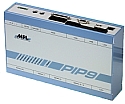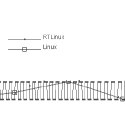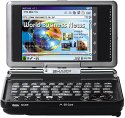Tiny, sub-$100 PC runs Puppy Linux
August 23, 2006 A Bangkok-based company is shipping a tiny, sub-$100 PC capable of running Puppy and other lightweight Linux distributions. NorhTec's MicroClient Jr. measures 4.5 inches square, draws 8 Watts, and has a 166MHz Pentium-compatible processor with three integer units. (more…)
A Bangkok-based company is shipping a tiny, sub-$100 PC capable of running Puppy and other lightweight Linux distributions. NorhTec's MicroClient Jr. measures 4.5 inches square, draws 8 Watts, and has a 166MHz Pentium-compatible processor with three integer units. (more…)
 The Mobile Robot Programming Lab (MRPL) at Carnegie Mellon University's Robotics Institute has published the first in a planned series of open, educational robotics designs. The Linux-based “Qwerkbot” can be built in two hours from detailed online instructions, at a cost of $550, the Lab says.
The Mobile Robot Programming Lab (MRPL) at Carnegie Mellon University's Robotics Institute has published the first in a planned series of open, educational robotics designs. The Linux-based “Qwerkbot” can be built in two hours from detailed online instructions, at a cost of $550, the Lab says.  German equipment manufacturer ASC Telecom has revised its Linux-based communications server, adding hybrid VoIP (voice-over-IP) and TDM (time-division multiplexing) recording capabilities.
German equipment manufacturer ASC Telecom has revised its Linux-based communications server, adding hybrid VoIP (voice-over-IP) and TDM (time-division multiplexing) recording capabilities.  Kontron has introduced a compact “mini baseboard” meant to help developers get up and running quickly with ETX-based computer-on-module (COM) designs. The aptly named “miniBaseboard” is compatible with the recently released
Kontron has introduced a compact “mini baseboard” meant to help developers get up and running quickly with ETX-based computer-on-module (COM) designs. The aptly named “miniBaseboard” is compatible with the recently released  DesktopLinux.com has launched its 2006 Desktop Linux survey, asking users of Linux desktops to identify what distributions they use, as well as their choice of windowing environment (KDE, GNOME, etc.), web browsers, email clients, and Windows-on-Linux solutions.
DesktopLinux.com has launched its 2006 Desktop Linux survey, asking users of Linux desktops to identify what distributions they use, as well as their choice of windowing environment (KDE, GNOME, etc.), web browsers, email clients, and Windows-on-Linux solutions.  Eurotech's U.S. arm, Parvus, will demonstrate the multinational company's innovative wrist-worn PC at a military electronics conference Aug. 22-24 in Ft. Lauderdale, Fla.
Eurotech's U.S. arm, Parvus, will demonstrate the multinational company's innovative wrist-worn PC at a military electronics conference Aug. 22-24 in Ft. Lauderdale, Fla.  Net stack vendor LVL7 will base its flagship “Fastpath” products on Wind River Linux. Starting with version 4.5, expected Q2, 2007, LVL7's Fastpath stack will be optimized for Wind River's Platform for Network Equipment, Linux Edition (PNE LE), the company says.
Net stack vendor LVL7 will base its flagship “Fastpath” products on Wind River Linux. Starting with version 4.5, expected Q2, 2007, LVL7's Fastpath stack will be optimized for Wind River's Platform for Network Equipment, Linux Edition (PNE LE), the company says.  MPL AG has added a new model to its line of “Packaged Industrial PCs” (PIP). The PIP9 is based on a 1 GHz Celeron M processor, and boasts an extensive set of “PC compatible” functions in a compact, industrial-strength package, according to the Switzerland-based company.
MPL AG has added a new model to its line of “Packaged Industrial PCs” (PIP). The PIP9 is based on a 1 GHz Celeron M processor, and boasts an extensive set of “PC compatible” functions in a compact, industrial-strength package, according to the Switzerland-based company.  This whitepaper describes the development of a real-time data-acquisition application using a real-time Linux implementation along with an off-the-shelf data-acquisition board.
This whitepaper describes the development of a real-time data-acquisition application using a real-time Linux implementation along with an off-the-shelf data-acquisition board.  Sharp's Linux-based Zaurus PDA was ahead of its time, and can still compete with modern Linux-based handhelds such as the
Sharp's Linux-based Zaurus PDA was ahead of its time, and can still compete with modern Linux-based handhelds such as the